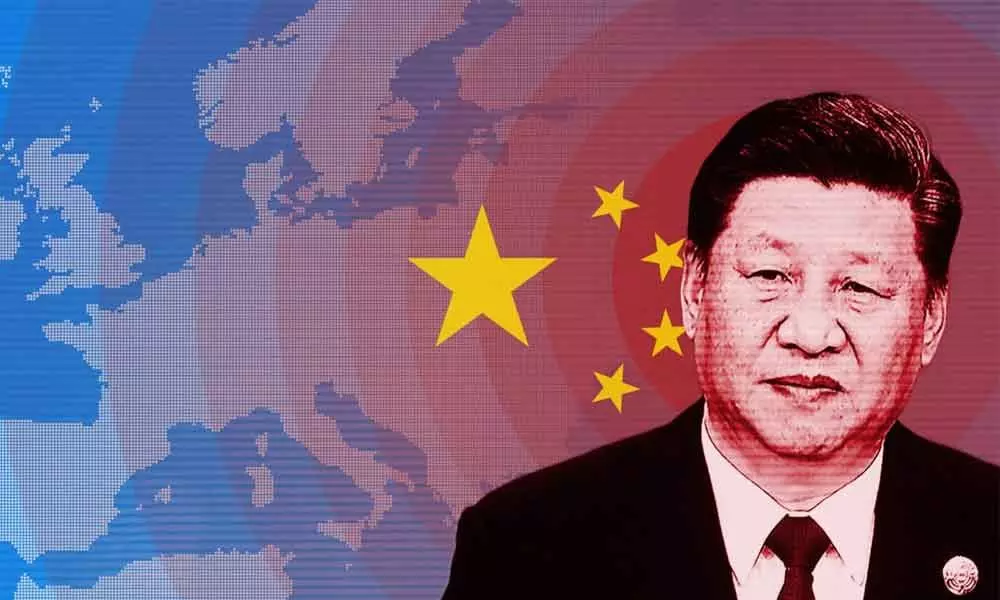Live
- MyVoice: Views of our readers 17th November 2024
- Congress dares Kishan to bathe in Musi
- Kishan launches Musi Nidra programme
- ‘Yuva Utsav-2024’ commences
- Fire safety drill held at Secretariat
- Meru Srujan 2024: A Spectacular Celebration of Talent and Culture
- Representatives of VIDASAM demand resignation of YSRCP MLAs
- Police grill BRS leader Jaipal Yadav
- Revanth sells 6Gs to woo voters in Maharashtra
- Cong govt striking balance between welfare, devpt
Just In
China under European Union pressure to open up economy


An angry European Union (EU) leadership questioned China intensely over the spread of coronavirus and 'warned' it against hiding anything.
An angry European Union (EU) leadership questioned China intensely over the spread of coronavirus and 'warned' it against hiding anything. If one were to look into the June 22 meeting of the EU and China, one could say that, or, one could even say, "look, the EU looked into the matter and pointed out certain concerns and pleaded with China..." With the Covid-19 pandemic preventing in-person discussions, President Xi Jinping and Premier Li Keqiang spoke separately by video link to presidents Ursula von der Leyen of the European Commission and Charles Michel of the European Council.
The talks had been postponed since March and the health and economic crisis coupled with challenging relations ensured that expectations were low. And quite rightly so. The summit on June 22 ended with no joint statement or news conference and both sides producing markedly different narratives of what occurred. The EU told China to make good on a promise to open up its economy and warned of 'very negative consequences' if Beijing goes ahead with a new security law on Hong Kong that the West says will curtail basic rights.
Speaking after video calls with Premier Li and President Xi, the EU's chief executive and chairman said they had repeated accusations that Beijing has spread disinformation about the coronavirus. "The relationship between the EU and China is simultaneously one of the most strategically important and one of the most challenging that we have," Ursula von der Leyen told a news conference. European Council President Charles Michel said China was not reciprocating the welcome that Chinese companies receive in Europe.
Calling China a partner and a rival, von der Leyen said Beijing had not followed up on a 2019 deal to allow greater access for European companies in China or drop rules requiring investors to share their know-how in Chinese joint ventures. Asking for "a higher level of attention" from Xi, von der Leyen said: "We have the intentions, the words put on paper, but we need the deeds.'' Now let us come to the crux of it. China's ownership of EU businesses is relatively small but has grown quickly over the past decade. A third of the bloc's total assets are now in the hands of foreign-owned, non-EU companies, according to a report from the European Commission in March. Of these, 9.5% of companies had their ownership based in China, Hong Kong or Macau (the latter two being China's Special Administrative Regions) - up from 2.5% in 2007.
That compares with 29% controlled by US and Canadian interests by the end of 2016 - down from nearly 42% in 2007. So, it is a significant increase, but the total amount is not huge, comparatively speaking. The amount of Chinese foreign direct investment in the EU has been rising rapidly, peaking at €37.2bn in 2016. However, it has fallen away since then amidst a slowdown in Chinese investment globally. Italy was the first major European economy to sign up to China's new Silk Road programme - known as the Belt and Road Initiative (BRI). It involves huge infrastructure building to increase trade between China and markets in Asia and Europe. Officially more than 20 countries in Europe (including Russia) are part of the initiative. For example, China is financing the expansion of the port of Piraeus in Greece and is building roads and railways in Serbia, Montenegro, Bosnia-Herzegovina and North Macedonia. Trade, ultimately, matters and nothing else.

© 2024 Hyderabad Media House Limited/The Hans India. All rights reserved. Powered by hocalwire.com






